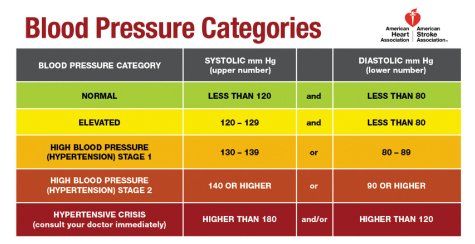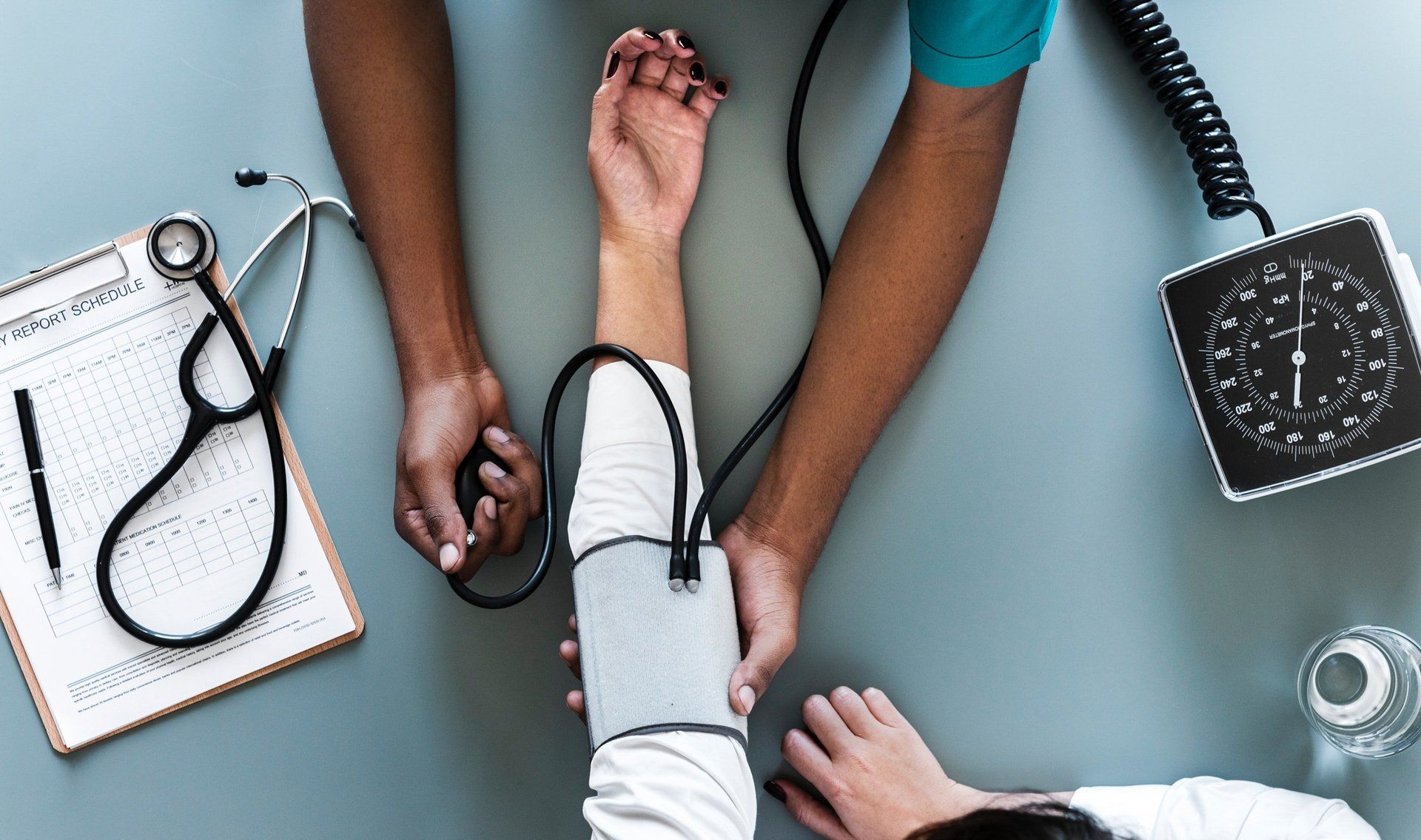How to Control High Blood Pressure: 8 Essential Things to Know
Have you been told you have high blood pressure? Wondering what you can do about it? Don’t worry - you’re certainly not alone.
According to the World Health Organization, an
estimated 1.28 billion adults aged 30 to 79 worldwide have high blood pressure. Perhaps even more concerningly, less than half of these adults are diagnosed and treated, and nearly half are unaware they have high blood pressure at all.
So, good news: you’re reading this blog post and looking for ways to manage high blood pressure, which means you’re already ahead of the game!
At Family Medical Center, we want to arm you with strategies for living your healthiest life. If you have high blood pressure, here are some of the most essential things to know as you seek treatment and make lifestyle changes.
Have you been told you have high blood pressure? Wondering what you can do about it? Don’t worry - you’re certainly not alone.
According to the World Health Organization, an
estimated 1.28 billion adults aged 30 to 79 worldwide have high blood pressure. Perhaps even more concerningly, less than half of these adults are diagnosed and treated, and nearly half are unaware they have high blood pressure at all.
So, good news: you’re reading this blog post and looking for ways to manage high blood pressure, which means you’re already ahead of the game!
At Family Medical Center, we want to arm you with strategies for living your healthiest life. If you have high blood pressure, here are some of the most essential things to know as you seek treatment and make lifestyle changes.
Understanding High Blood Pressure
High blood pressure, or hypertension, is a condition in which the force of the blood against the artery walls is consistently too high.
This “silent killer” can lead to serious health issues such as heart disease, stroke risk factors, and chronic kidney disease - especially if left uncontrolled.
Blood pressure is measured using a device called a sphygmomanometer, which includes an inflatable cuff that’s wrapped around your arm and a gauge that measures the pressure. The procedure typically involves…
- Inflating the cuff to temporarily stop the flow of blood in the artery.
- Slowly deflating the cuff while the healthcare provider listens with a stethoscope or uses a digital device to detect the point at which blood flow returns (systolic pressure) and when it flows freely again (diastolic pressure).
Systolic pressure is the top number in blood pressure readings. It measures the pressure in your arteries when your heart beats. Your diastolic pressure is the bottom number in the reading, measuring the pressure in your arteries when your heart is at rest between beats.
According to the American Heart Association,
normal blood pressure levels have a systolic reading lower than 120 mm Hg and diastolic lower than 80 mm Hg. Official diagnosis for hypertension can be made when systolic is 130 or higher or diastolic is 80 or higher.

1. You Need to Check It Regularly
Regular blood pressure monitoring is crucial if you have high blood pressure. This is the only real way to study the effectiveness of treatment and detect any dangerous spikes.
The frequency of recommended monitoring depends largely on your health status and doctor's advice. Generally, it's best to check it at least once a week if it's well-controlled, but your doctor might suggest daily blood pressure readings if you have unstable or high blood pressure.
How to Use a Home Blood Pressure Monitor
Start by sitting in a comfortable chair with your back supported and both feet flat on the floor. Rest your arm on a table at heart level. Ensure you are relaxed and avoid talking or moving during the measurement.
Place the cuff on your upper arm, following the manufacturer's instructions for positioning. Turn on the home blood pressure monitor and start the measurement, then wait quietly until the reading is complete.
Once you’re done, record your readings, including the date and time. That way, you can share them with your healthcare professional at your next appointment.
2. Your Diet Makes a Difference
You have likely heard that you are what you eat, and it’s true. Your diet has widespread impacts on your health, including your blood pressure.
That’s why researchers and doctors have developed the DASH (Dietary Approaches to Stop Hypertension) diet. It’s specifically designed to help manage and reduce high blood pressure by emphasizing the consumption of nutrient-rich foods low in sodium, added sugars, and unhealthy fats.
Many foods can help lower high blood pressure, including whole grains, leafy greens, berries, oats, bananas, and fatty fish like salmon. These are high in potassium, magnesium, and fiber - essential nutrients for maintaining healthy blood pressure.
On the flip side, it's recommended that people with high blood pressure limit their sodium intake by avoiding processed foods, canned soups, and salty snacks. Additionally, cutting back on saturated and trans fats in fried foods, full-fat dairy products, and certain oils can help manage blood pressure.
3. You Can’t Neglect Physical Exercise
Get moving! Regular exercise is highly beneficial for controlling high blood pressure. It strengthens the heart, enabling it to pump blood more efficiently and reducing the force on the arteries.
For those with high blood pressure, a combination of aerobic exercises (such as walking, jogging, swimming, and cycling), strength training (like lifting weights or using resistance bands), and flexibility exercises (such as yoga or stretching) can be life-changing.
We know you’re busy, but physical exercise needs to be a priority. Consider taking short walks during breaks, using stairs instead of elevators, engaging in active hobbies like gardening, and setting regular workout times to build consistency.
Starting with small, manageable goals and gradually increasing activity levels can help make exercise a sustainable part of your lifestyle.
4. Weight Is Closely Tied to Blood Pressure
There is a strong connection between weight and high blood pressure. Specifically, excess weight can increase the strain on the heart, leading to concerning blood pressure levels.
Achieving and maintaining a healthy weight can help control high blood pressure and reduce the risk of hypertension-related complications. Strategies for healthy weight management include adopting a balanced diet rich in whole foods, controlling portion sizes, and engaging in regular physical activity.
Additionally, you need to know
your
ideal healthy weight. Focus on losing weight gradually and making lifestyle changes such as reducing calorie intake, increasing daily physical activity, and seeking support from healthcare professionals.
5. It’s Best to Limit Alcohol & Tobacco
Alcohol can raise blood pressure by several points, and excessive drinking can lead to long-term hypertension. Moderate alcohol consumption is key to minimizing its impact on blood pressure.
For most adults, this means up to one drink per day for women and up to two drinks per day for men. Be mindful of portion sizes, as standard drinks contain different amounts of alcohol.
Additionally, smoking has immensely detrimental effects on cardiovascular health, contributing to the buildup of plaque in the arteries (atherosclerosis), reducing oxygen levels in the blood, and causing a temporary increase in blood pressure.
Quitting smoking has significant benefits, especially for those with high blood pressure. Within just a few weeks of quitting, blood pressure can begin to normalize, circulation improves, and the risk of heart disease and stroke decreases significantly.
6. Stress Is a Frequent Culprit
Stress can significantly influence high blood pressure by triggering the release of hormones that temporarily increase heart rate and constrict blood vessels. Chronic stress may lead to persistent high blood pressure and increase the risk of cardiovascular disease.
Strategies such as meditation and deep breathing can help relax the mind and body, reducing stress hormones. Regularly practicing these stress management techniques can promote a sense of calm, improve emotional well-being, and help lower your elevated blood pressure.
7. Blood Pressure Medicine Adherence Matters
Common high-blood pressure medications include diuretics, ACE inhibitors, ARBs (angiotensin II receptor blockers), beta-blockers, calcium channel blockers, and vasodilators. These medications are often used in combination to achieve optimal blood pressure control, and they must be taken as prescribed.
Following your doctor’s plans is a crucial part of effectively treating high blood pressure and preventing complications. Consistent medication adherence helps maintain stable blood pressure levels and reduces the risk of heart disease, stroke, and kidney damage.
Struggle to remember your blood pressure medications every day? Try using pill organizers, setting alarms or reminders on your phone, and incorporating your pills into your daily routine, such as during meals.
If the side effects of your blood pressure medication make you less likely to stick to it, talk to your healthcare provider. They can likely adjust dosages or switch medications to help you stay on track and improve your quality of life.
8. You Need Regular Medical Checkups
Last, but certainly not least, regular general care checkups with trusted healthcare providers are non-negotiable when managing high blood pressure.
These appointments allow for monitoring blood pressure levels, assessing overall health, and adjusting treatment plans as needed. Focus on building a strong relationship with your healthcare provider so they can provide more personalized care and timely interventions.
Don’t skip your checkups.
If you do, you run the risk of leaving necessary changes unaddressed. Additionally, these visits provide opportunities to discuss lifestyle modifications, medication adherence, and your ongoing medical history.
In Summary
Managing high blood pressure involves a multi-faceted approach - one that combines elements such as a healthy diet, exercise, medications, and regular care from an experienced medical provider, among other strategies.
Even if you have normal blood pressure, these recommendations are still applicable and can help you minimize your risk of hypertension in the future.
Worried About Your High Blood Pressure? Get Checked With Us.
If you're concerned, don't hesitate to get your blood pressure checked by our providers at Family Medical Center. Our Lake Odessa team offers personalized care and support to help you on your journey to full-body wellness.
Request an appointment today. We’ll help you take proactive steps toward managing your high blood pressure and making lifestyle changes that are actually sustainable.

Your Family’s Health Is Our Priority
Your wellness matters to us. Take the next step in your care today.
1020 4th Ave
Lake Odessa, MI 48849
oFFICE HOURS
- Mon - Tue
- -
- Wed - Thu
- -
- Fri - Sun
- Closed
AFTER HOURS EMERGENCY CONTACT
1020 4th Ave
Lake Odessa, MI 48849
oFFICE HOURS
- Mon - Tue
- -
- Wed - Thu
- -
- Fri - Sun
- Closed
AFTER HOURS EMERGENCY CONTACT
All Rights Reserved
FAMILY MEDICAL CENTER
website designed by SPECK DESIGNS
All Rights Reserved | FAMILY MEDICAL CENTER
website designed by SPECK DESIGNS





